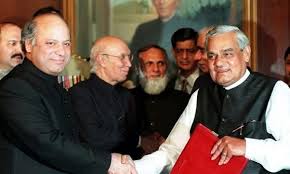According to the statement of External Affairs Minister, Dr. S Jaishankar in the Rajya Sabha, the Shimla Agreement and the Lahore Declaration provides the basis to resolve all issues between India and Pakistan. This statement comes into existence as Donald Trump stated that Prime Minister Narendra Modi had asked him to mediate in the Kashmir issue.
Let us know what is the Shimla Agreement and the Lahore Declaration.
The Shimla Agreement
The Shimla Agreement was signed by Prime Minister Indira Gandhi and President Zulfikar Ali Bhutto of Pakistan on 2nd July 1972. It was much more than a peace treaty seeking to reverse the consequences of the 1971 war.
It was a mutual commitment between the 2 governments to the peaceful resolution of all issues through direct bilateral approaches, to build the foundations of a cooperative relationship with special focus on people to people contacts and to uphold the inviolability of the Line of Control in Jammu and Kashmir, which is a most important CBM between India and Pakistan, and a key to durable peace.
In order to initiate the process of the establishment of durable peace, both the Governments agree that:
- Indian and Pakistani forces shall be withdrawn to their side of the international border.
- In Jammu and Kashmir, the line of control resulting from the cease-fire of December 17, 1971, shall be respected by both sides without prejudice to the recognized position of either side. Neither side shall seek to alter it unilaterally, irrespective of mutual differences and legal interpretations. Both sides further undertake to refrain from the threat or the use of force in violation of this Line.
The Lahore Declaration of 1999
The Prime Ministers of India Atal Bihari Vajpayee and Prime Minister of Pakistan Nawaz Sharif signed the Lahore declaration, in February 1999
The declaration was signed in order to share a vision of peace and stability between their countries, and of progress and prosperity for their peoples. It convinced that durable peace and development of harmonious relations and friendly cooperation will serve the vital interests of the peoples of the two countries, enabling them to devote their energies for a better future. It also said that both countries will recognize the nuclear dimension of the security environment of the two countries adds to their responsibility for avoidance of conflict between the two countries.
It is committed to the principles and purposes of the Charter of the United Nations, and the universally accepted principles of peaceful co-existence
Reiterating the determination of both countries to implement the Shimla Agreement in letter and spirit.
Recalling their agreement of 23rd September 1998, that an environment of peace and security is in the supreme national interest of both sides and that the resolution of all outstanding issues, including Jammu and Kashmir, is essential for this purpose. Both governments agreed that:
- They shall intensify their efforts to resolve all issues, including the issue of Jammu and Kashmir.
- They shall refrain from intervention and interference in each other’s internal affairs.
- They shall intensify their composite and integrated dialogue process for an early and positive outcome of the agreed bilateral agenda.
- They shall take immediate steps for reducing the risk of accidental or unauthorised use of nuclear weapons and discuss concepts and doctrines with a view to elaborating measures for confidence building in the nuclear and conventional fields, aimed at prevention of conflict.
- They shall reaffirm their commitment to the goals and objectives of SAARC and to concert their efforts towards the realisation of the SAARC vision for the year 2000 and beyond with a view to promoting the welfare of the peoples of South Asia and to improve their quality of life through accelerated economic growth, social progress and cultural development.
- They shall reaffirm their condemnation of terrorism in all its forms and manifestations and their determination to combat this menace.
- They shall promote and protect all human rights and fundamental freedom

Leave a Reply